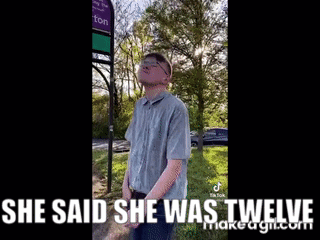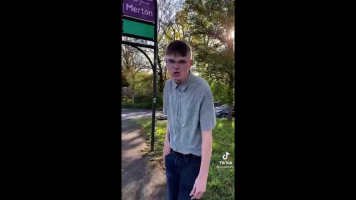The Viral Enigma Of "She Said She Was 12": Origins, Evolution, And Ethical Implications
The Unexpected Birth of a Viral Phrase
Every viral sensation has an origin story, and for "she said she was 12," its roots trace back to a specific YouTube video that captured an unexpected reaction. The phrase gained significant traction following a February 2021 upload by the popular YouTube creators, The Prince Family. Their video, controversially titled "Guess Her Age Challenge **We Failed**," featured Damien Prince and his wife Biannca reacting in shock to a revelation during the challenge. The accompanying thumbnail, designed to evoke surprise, became instantly recognizable and helped propel the phrase into wider circulation. The core of the meme lies in the audio snippet itself, often extracted and shared independently. While the original video's context was a lighthearted, albeit exaggerated, "guess her age" challenge, the soundbite quickly detached from this setting. This detachment is a common characteristic of internet memes, where a brief, impactful moment is lifted and repurposed, often without the full understanding of its initial intent. As one of the provided data points notes, "This video is about the she said she was 12 meme, It is the original video and many people have only heard of the meme," highlighting this very phenomenon. The original video, available on YouTube, became the genesis, but the meme's life truly began when the audio and the phrase started circulating independently.From YouTube Challenge to Cultural Phenomenon
Once born, internet memes spread like wildfire, traversing platforms and morphing into various formats. "She said she was 12" was no exception. What started as a specific reaction in a YouTube video quickly found its way to other corners of the internet, becoming a ubiquitous audio clip and a visual cue.The Digital Echo Chamber: "She Said She Was 12" Across Platforms
The journey of "she said she was 12" from a singular YouTube moment to a widespread internet phenomenon is a testament to the interconnectedness and rapid dissemination capabilities of modern digital platforms. This phrase, primarily as an audio clip, became a staple in various forms of online content, demonstrating how a simple sound can transcend its original context and embed itself into popular culture.TikTok's Role in Amplification
Perhaps no platform played a more significant role in the amplification of "she said she was 12" than TikTok. The short-form video platform, known for its trending sounds and viral challenges, provided the perfect environment for the phrase to flourish. Users would incorporate the audio into their own videos, often for comedic effect or to react to surprising situations. As the data suggests, "Tiktok video from hi (@hello1202k), “she said she was 12😂😂”" and "Yo liam, have you heard that tiktok audio about a girl being 12 or some shit? the one that goes like she said she was twelve? yeah, that audio! get the she said she was," illustrate its widespread use as a recognizable sound. The hashtag #shesaidshewas12 amassed thousands of posts, with "3243 posts watch the latest videos about #shesaidshewas12 on tiktok," underscoring its immense popularity and the sheer volume of content it inspired.Memes, GIFs, and Audio Snippets
Beyond TikTok, the phrase permeated other aspects of meme culture. It became a popular sound button on sites like MyInstants, allowing users to "Listen & share she said she was 12" with ease. Animated GIFs featuring the phrase, or reactions associated with it, became common, serving as "the perfect she said she was 12 animated gif for your conversation" on platforms like Tenor. Meme compilation videos featuring the "trending 'she said she was 12' joke" were widely shared on YouTube and within communities like the "memevideos community," which boasts "444k subscribers" dedicated to such content. Even subreddits like "greatbritishmemes" and the official "know your meme website" subreddit acknowledged and documented its rise, showcasing its broad cultural penetration. The phrase even found its way into music, as evidenced by a release from DistroKid titled "she said she was 12" by luljayy.7, further solidifying its status as a recognized audio snippet. This widespread adoption across diverse platforms demonstrates the power of a simple, catchy phrase to become a digital shorthand for surprise, disbelief, or even just a comedic punchline, illustrating how "an element of a culture or system of behavior" can spread rapidly in the digital age.The Disturbing Underbelly: When Memes Go Wrong
While many memes are harmless, and some even bring joy, the journey of "she said she was 12" took a darker turn. As it became more pervasive, its original, relatively innocent context was completely lost for many, leading to deeply problematic and offensive interpretations. This highlights a critical issue in internet culture: the potential for content to be stripped of its original meaning and weaponized or misused in harmful ways.The Perilous Misinterpretation and Misuse
The most concerning aspect of the "she said she was 12" meme is its potential for misuse in contexts related to child exploitation. As one of the provided data points explicitly states, it is crucial to "Learn what she said she was twelve means and why it is a disturbing and offensive term." The phrase has unfortunately been "used to defend sexual activity with minors," which is an abhorrent and illegal application. This alarming development underscores the danger of decontextualized content, where a phrase initially associated with a "guess her age" challenge can be twisted into something far more sinister. The virality of the phrase, coupled with its brevity, makes it susceptible to such dangerous misinterpretations. When the phrase is detached from the visual context of The Prince Family's reaction and the specific "guess her age" scenario, it can be easily co-opted and used to normalize or trivialize incredibly serious issues. This transformation from a comedic soundbite to a potentially harmful justification is a stark reminder of the ethical responsibilities that come with creating and consuming online content.Addressing the Harmful Narrative
It is imperative to actively combat the harmful narratives that can emerge from such memes. Understanding the true origin of "she said she was 12" (a reaction to an age guess) is vital, but equally important is recognizing and condemning its problematic misapplication. Online communities and platforms have a role to play in identifying and preventing such abusive uses. For instance, the "Know Your Meme" website, a resource for understanding internet culture, often delves into the origins and various interpretations of memes, including their controversial aspects. The discussion around "she said she was 12" serves as a critical case study in the broader conversation about online safety and the protection of vulnerable individuals. While a TikTok user claiming to "expose the truth behind the viral 'she said she was 12' video meme that shows a woman's transformation from young to old" might point to a different visual meme using the audio, the core concern remains the audio's decontextualized use in harmful ways. It's not just about what the meme *shows*, but what the *phrase itself* implies when taken out of its original, benign context.Navigating the Nuances of Online Culture
The story of "she said she was 12" is a microcosm of the complexities inherent in modern internet culture. It showcases the incredible speed at which content can spread, the creative ways in which it can be remixed, and the unforeseen, often disturbing, paths it can take.Responsibility in the Age of Virality
In an era where "a way of describing cultural information being shared" happens instantaneously, both content creators and consumers bear a significant responsibility. For creators, understanding the potential for misinterpretation and the broader societal implications of their content is crucial. Even if the original intent is innocent, the internet's capacity for decontextualization means that phrases can quickly become detached and repurposed in ways never intended. For consumers, critical thinking and media literacy are paramount. Before sharing or engaging with a meme, especially one with a potentially ambiguous or controversial phrase, it's important to consider its possible interpretations and the message it might inadvertently convey. Understanding the "origin, meme, and real story" behind viral content, as some users like josephwillobs attempt to uncover, can help in navigating these nuanced situations. Platforms like TikTok and YouTube also face the ongoing challenge of moderating content to prevent the spread of harmful material while balancing freedom of expression. The case of "she said she was 12" underscores the delicate balance between humor, virality, and ethical responsibility in the digital age.Final Thoughts: A Call for Conscious Consumption
The journey of "she said she was 12" from a fleeting moment in a YouTube challenge to a pervasive internet meme is a fascinating, yet cautionary, tale. It exemplifies how quickly a phrase can enter the cultural lexicon, becoming instantly recognizable through audio snippets, GIFs, and countless social media posts. While its initial virality stemmed from a moment of comedic surprise, its subsequent evolution highlights the profound impact of decontextualization in the digital realm. The phrase's disturbing misuse to justify or trivialize illegal activities underscores the critical need for awareness and responsibility in online interactions. As we continue to engage with the dynamic world of internet memes, it becomes increasingly vital to understand not just what makes content go viral, but also the potential ethical implications and the broader societal conversations they might inadvertently ignite. By fostering a culture of conscious consumption and critical engagement, we can collectively work towards a more responsible and safer online environment.
Meme She Said She Was 12 GIF - Meme She said she was 12 - Discover

“She Said She Was 12” Original Video #tiktok - YouTube

She said she was 12 Meme Sound Effect - Voicy